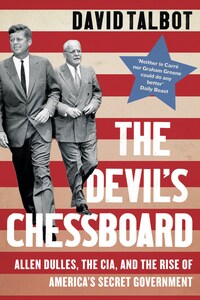William Collins
An imprint of HarperCollinsPublishers Ltd
1 London Bridge Street
London SE1 9GF
www.williamcollinsbooks.com
First published in Great Britain by William Collins in 2015
First published in the USA by Harper in 2015
Copyright © 2015 by The Talbot Players, LLC.
Cover photograph © AP/PA Images. Design © Kate Gaughran
David Talbot asserts the moral right to be identified as the author of this work.
A catalogue copy of this book is available from the British Library.
All rights reserved under International and Pan-American Copyright Conventions. By payment of the required fees, you have been granted the non-exclusive, non-transferable right to access and read the text of this e-book on screen. No part of this text may be reproduced, transmitted, down-loaded, decompiled, reverse engineered, or stored in or introduced into any information storage and retrieval system, in any form or by any means, whether electronic or mechanical, now known or hereinafter invented, without the express written permission of HarperCollins.
Source ISBN: 9780008159665
Ebook Edition © October 2015 ISBN: 9780008159672
Version: 2016-09-27
To Karen Croft, who dared to know
And ye shall know the truth, and the truth shall make you free.
—THE INSCRIPTION CHOSEN BY ALLEN DULLES FOR THE LOBBY OF CIA HEADQUARTERS, FROM
JOHN 8:31–32
The Colonel laughed unpleasantly. “My dear friend, Dimitrios would have nothing to do with the actual shooting. No! His kind never risk their skins like that. They stay on the fringe of the plot. They are the professionals, the entrepreneurs, the links between the businessmen, the politicians who desire the end but are afraid of the means, and the fanatics, the idealists who are prepared to die for their convictions. The important thing to know about an assassination or an attempted assassination is not who fired the shot, but who paid for the bullet.”
—A COFFIN FOR DIMITRIOS, ERIC AMBLER
Contents
Cover
Title Page
Copyright
Dedication
Epigraph
Prologue
Part I
1. The Double Agent
2. Human Smoke
3. Ghosts of Nuremberg
4. Sunrise
5. Ratlines
Part II
6. Useful People
7. Little Mice
8. Scoundrel Time
9. The Power Elite
10. The Dulles Imperium
11. Strange Love
12. Brain Warfare
13. Dangerous Ideas
14. The Torch Is Passed
Part III
15. Contempt
16. Rome on the Potomac
17. The Parting Glass
18. The Big Event
19. The Fingerprints of Intelligence
20. For the Good of the Country
21. “I Can’t Look and Won’t Look”
22. End Game
Epilogue
Picture Section
Notes
Index
Acknowledgments
About the Author
Also by David Talbot
About the Publisher
That little Kennedy … he thought he was a god.”
The words were sharp and wrong, like a curse shattering the civility of the soft evening air. They seemed particularly strange coming from the genial older gentleman strolling by Willie Morris’s side. In fact, they were the only strident remarks that Morris had heard him utter in the past few days, as the graying spymaster regaled his young visitor with a lifetime of covert adventures.
And then the storm passed. The man was himself again—the chatty and amiable Allen Welsh Dulles, a man whose conviviality masked a world of dark secrets. The two men continued their walk on that Indian summer evening in 1965, ambling along the rust-colored brick sidewalks as the lampposts began casting their yellow light on picturesque Georgetown—home of Washington hostesses, martini-loving spies, influential newspapermen, and the assorted insiders who fed off the fizz and sizzle of the nation’s capital. Turning the corner from the unassuming, two-story brick mansion on Q Street that Dulles rented, they now found themselves on R Street, straddling the vast greenery of the Dumbarton Oaks estate.
Dulles, the creator of America’s sprawling intelligence empire, had summoned Morris—a rising young editor at Harper’s magazine—to help him set the record straight on the most cutting humiliation of his career. He wanted to write his side of the story about the Bay of Pigs. The words alone still brought a spasm of pain and rage to Dulles’s face. It was just a spit of sand and scrubby palms along Cuba’s southern coast. But it was the scene, in April 1961, of the biggest disaster in the CIA’s history—a motley invasion that fell ignominiously short of toppling Cuba’s dangerously charismatic leader, Fidel Castro. The failed invasion, Dulles said, was “the blackest day of my life.”
In public, the newly minted president, John F. Kennedy, took responsibility for the fiasco and made gracious remarks about Dulles as he prepared to usher the aging spy out the door, after a half century of public service encompassing eight different presidencies. But in private, a vicious war had begun between the Kennedy and Dulles camps, with the two men and their advocates working the press and arguing not just the botched mechanics of the invasion, but the past and future of U.S. foreign policy.








